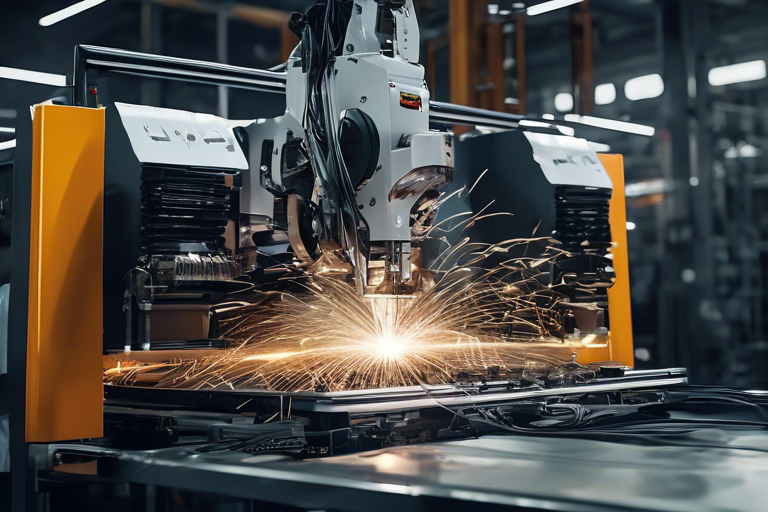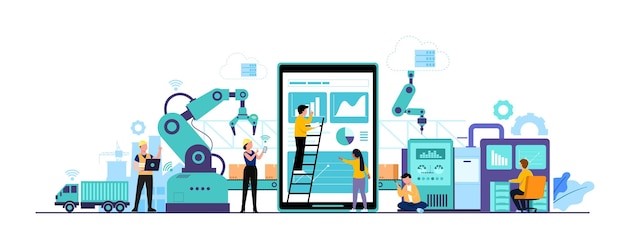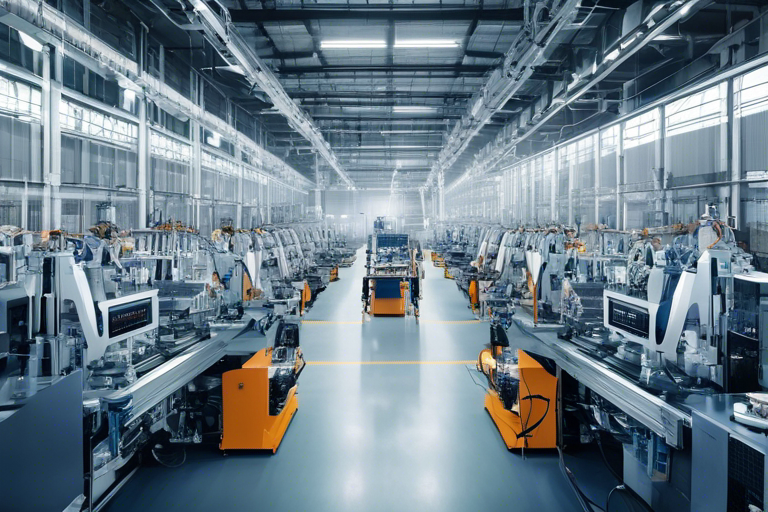
Top Smart Manufacturing Companies Leading the Future of Industry 2024: A Comprehensive Overview
Smart manufacturing is a broad term that encompasses a variety of technologies, systems, and practices. It has the potential to revolutionize the industrial landscape, offering unprecedented operational efficiency, productivity, and profitability. This article delves deep into the world of smart manufacturing, shedding light on key players, technologies, market dynamics, and future prospects.
Understanding Smart Manufacturing
Smart manufacturing is the incorporation of advanced digital technologies into manufacturing processes. It leverages data, machine learning, and AI to optimize production efficiency and performance. A key component of Industry 4.0, smart manufacturing is set to redefine the industrial sector.
The Market for Smart Manufacturing
The smart manufacturing market is projected to grow at a CAGR of more than 19% for the next five to six years. This surge is primarily driven by the rising popularity of enabling technologies and the positive impact of the COVID-19 pandemic on various industries.
Key Players in Smart Manufacturing- Top 3 Companies

The smart manufacturing landscape is characterized by the presence of numerous key players who are driving innovation and growth.
- ABB (Switzerland)
ABB, a Swiss multinational corporation, is at the forefront of the Smart Manufacturing revolution. The company is known for its cutting-edge robotics, machine automation, and digital services solutions, tailored for various industries.
Business Divisions
ABB operates through four distinct business divisions:
- Electrification
- Motion
- Process Automation
- Robotics & Discrete Automation
Robotics & Discrete Automation
The Robotics and Discrete Automation arm of ABB is a leading supplier of industrial robots and adaptable manufacturing systems, deploying over 300,000 ABB robots worldwide. These robots cater to diverse sectors, including automotive, food & beverages, chemicals, pharmaceuticals, and more.
Key Features
- Variety of Designs: ABB's product lineup includes traditional industrial robots and collaborative variants characterized by articulated, parallel, or SCARA designs.
- Impressive Payload Capacity: These robots boast an impressive payload capacity, ranging from 0.5 kg to 800 kg.
- Specialized Robots: ABB also specializes in crafting specialized robots designed for painting and door-opening applications.
- Efficient Automation Control: ABB’s intricate network model, Ability™, seamlessly links multiple robots and robotic equipment, facilitating efficient automation control and real-time monitoring.
- Mitsubishi Electric Corporation (Japan)
Another prominent player in the Smart Manufacturing market is Mitsubishi Electric Corporation. The company operates through six segments—Energy and Electric Systems, Industrial Automation Systems, Information and Communication Systems, Electronic Devices, Home Appliances, and Others.
Industrial Automation Systems
Mitsubishi’s Industrial Automation Systems segment includes a wide range of products, such as PLCs, servomotors, investors, industrial robots, automotive electrical equipment, industrial fans, UPS, ADAS-related products, and more.
MELFA Lineup of Industrial Robots
Industrial robots are offered under the MELFA lineup and have a payload capacity ranging from 2 kg to 70 kg. The company provides articulated and SCARA robots for medical, food handling, and cleanroom applications.
- FANUC CORPORATION
FANUC CORPORATION, a Japanese multinational, operates across four distinct divisions: Factory Automation (FA), ROBOT, ROBOMACHINE, and Service. The company boasts over 100 industrial robots within the ROBOT division, each designed to address many applications.
Industrial Robots
FANUC CORPORATION’s industrial robots are pivotal in automating processes like welding, material handling, assembly, and painting across various industries, including automotive, electrical & electronics, logistics, food & beverages, cosmetics, and pharmaceuticals.
Key Features
- Impressive Payload Capacities: Some of the company’s traditional industrial robots exhibit impressive payload capacities, reaching 2,300 kg.
- Innovative Offerings: The latest additions to their collaborative robot lineup can be found under the CRX series.
- Productivity Enhancement: FANUC CORPORATION has introduced the FIELD system (FANUC CORPORATION Intelligent Edge Link & Drive System), an innovative open platform that enhances productivity, efficiency, and centralized management of industrial equipment, including industrial robots.
The Competitive Landscape
In addition to the top three players mentioned above, several other companies are driving innovation and shaping the future of smart manufacturing. Let's explore some of these key players:
- 3D Systems, Inc. (US)
- Cisco System, Inc. (US)
- Emerson Electric Co. (US)
- General Electric (US)
- Honeywell International Inc. (US)
- IBM (US)
- Rockwell Automation (US)
- Schneider Electric (France)
- Siemens (Germany)
- Oracle (US)
- SAP (Germany)
- Stratasys (US)
- Yokogawa Electric Corporation (Japan)
These companies have a global presence and offer a wide range of smart manufacturing solutions and services1. Leveraging their research and development capabilities and diversified product portfolios, these market leaders aim to increase their market share and drive innovation in the industry
Enabling Technologies in Smart Manufacturing
Smart manufacturing incorporates several enabling technologies. These include:
- Digital Twin: A digital twin is a digital replica of a physical system. It enables real-time monitoring, remote control, and optimization of factory operations.
- AI in Manufacturing: Artificial Intelligence (AI) in manufacturing involves the use of machine learning algorithms and AI-powered automation systems to improve manufacturing efficiency and reduce operational costs.
- Industrial IoT: The Industrial Internet of Things (IIoT) involves the use of internet-connected machinery to monitor and control industrial processes.
- 3D Printing: 3D printing, or additive manufacturing, is a process of making three-dimensional solid objects from a digital file. It has the potential to revolutionize manufacturing by enabling on-demand production and reducing waste.
- Industrial Robotics: Industrial robots are programmable machines capable of carrying out complex manufacturing tasks. They increase productivity, improve product quality, and enhance worker safety.
- Machine Vision: Machine vision systems capture and process images of manufacturing processes to inspect and control operations.
- Cybersecurity: As manufacturing becomes more connected, cybersecurity becomes increasingly important. Industrial cybersecurity solutions protect manufacturing systems from cyber threats.
80% of the Forbes Global 2000 B2B companies rely on MarketsandMarkets to identify growth opportunities in emerging technologies and use cases that will have a positive revenue impact.
- Food Packaging Market Size Set for Strong Growth Through 2030 Amid Rising Demand for Convenience Foods
- Fertilizers Industry Set to Grow at 4.1% CAGR Through 2030
- Leading Automated Guided Vehicle Companies 2024: An In-depth Analysis
- CHARGED UP: SHIFT TO E-MOBILITY AND THE EVOLUTION OF TRANSPORTATION
- Global Automotive Market: Predictions For 2024
Smart Manufacturing in Different Industries
Smart manufacturing finds application in various industries. Automotive and aerospace are the most lucrative sectors, collectively accounting for an opportunity of more than USD 65 billion by 2027. Other industries that can greatly benefit from smart manufacturing include oil and gas, food and beverages, pharmaceuticals, and semiconductors and electronics.
Regional Analysis
The growth of smart manufacturing varies by region. North America is expected to dominate the market due to its advanced manufacturing sector and high adoption rate of new technologies. The Asia Pacific region, on the other hand, is expected to witness the highest growth rate due to the rapid industrialization in countries like China and India.

Future Trends and Opportunities of Smart Manufacturing
The smart manufacturing market is poised for significant growth, driven by advancements in technology and increasing consumer demand for customized products. Key trends and opportunities in the industry include:
- Additive Manufacturing (3D Printing): Additive manufacturing technologies enable manufacturers to create highly customized products with increased efficiency and cost-effectiveness1. 3D printing, in particular, allows for greater product variation without sacrificing efficiency, opening up new possibilities for customization in various industries1.
- Advanced Robotics: Advanced robotics, including collaborative robots, are revolutionizing manufacturing processes by increasing automation, improving efficiency, and ensuring worker safety1. These robots are capable of working alongside human operators, enhancing productivity and flexibility on the factory floor1.
- Digital Transformation: The integration of digital technologies such as artificial intelligence, machine learning, and the Internet of Things (IoT) is driving the digital transformation of the manufacturing industry1. Smart manufacturing systems leverage these technologies to optimize production processes, improve quality control, and enable predictive maintenance1.
- Cybersecurity: With the increasing reliance on interconnected systems and data-driven manufacturing processes, cybersecurity becomes a critical concern for the industry1. Implementing robust cybersecurity measures is essential to protect sensitive data, intellectual property, and the integrity of manufacturing operations
Conclusion
Smart manufacturing is a game-changing development in the industrial sector. By integrating advanced digital technologies into manufacturing processes, it promises to transform the way industries operate, offering unprecedented levels of efficiency, productivity, and profitability. As more companies adopt smart manufacturing practices, the market for smart manufacturing is set to experience significant growth in the coming years.
Additional Information:
- To learn more about the assumptions considered for the study, you can download the PDF brochure
Authored by Farhan Hussain, Co-Authored by Kevin Kelly, Co-author Shweta Surender, MarketsandMarkets
- Continuous Manufacturing Market By Product (Integrated system, Semi-continuous (Granulator, Coater, Blender), Control), Application (API, End Product (Solid Dosage)), End User (R&D Department (CRO), Pharmaceutical Companies, CMO)- Global Forecast to 2022
- Smart Manufacturing Market - Edge Computing, Industrial 3D Printing, Robots, Sensor, Machine Vision, Artificial intelligence, Cybersecurity, Digital Twin, Private 5G, AGV, AMR, AR & VR, CAD, CAM, PLM, HMI, IPC, MES, WMS, and ERP - Global Forecast to 2029
- IoT in Manufacturing Market by Component (Solutions (Network Management and Data Management) and Services (Professional and Managed)), Deployment Mode, Organization Size, Application, Vertical (Process and Discrete) and Region - Global Forecast to 2026


